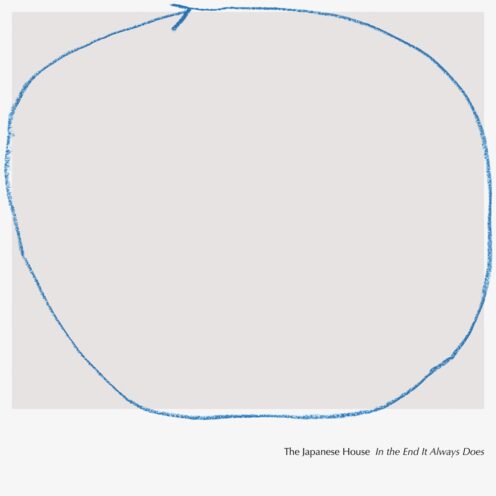
The second full-length studio album by The Japanese House, called In The End It Always Does, is a rich display of emotion from Amber Bain who continues to explore the depth of her music. The set was produced by Bain, The 1975’s George Daniel, and Chloe Kraemer, with each of the talented artists leaving behind their musical blueprint on it. Having not released any music since the 2020 EP, Chewing Cotton Wool, The Japanese House could have gone in a number of directions with the proper follow-up to 2019’s Good At Falling. The latest studio effort relies less on atmospheric elements and sounds, and instead highlights Bain’s musical development with a more indie rock feel to the song structures and sonically it breathes new life into the allure of what makes this artist so special.
After a brief introductory song called “Spot Dog,” that is eerily reminiscent of the lead tracks by The 1975, The Japanese House explode out of the gate with “Touching Yourself.” It features a great bass line paired with vibrant electric guitars that make each of Bain’s lyrics seem more fulfilled. The chorus of, “Picture your face / I wanna touch you, but you’re too far away / And when you call me, I’m all over the place now / You think it’s different, but it’s always the same / I wanna touch you, but…” paint a picture of a person feeling conflicted in a relationship that distance is putting a strain on. The second single to be released from the LP, “Sad To Breathe,” follows in the sequencing with a more similar sound to what the band went for on their debut album. While it does remind me more of that era of The Japanese House, Bain’s crisp vocal delivery feels more confident and in the forefront of the mix. It’s another great example of an artist maturing at just the right pace of their trajectory.
The synth-pop of “Over There” has a very 80’s feel to it, and Bain’s control over the tempo is truly a marvel to watch. When she goes into her higher register vocally, the vulnerability in her voice further accentuates the emotion behind the lyrics. “Morning Pages” features a collaboration by MUNA, and their chemistry of playing off of each other works well on this track. Bain’s lyrics towards the tail end of the song highlight a person becoming enamored with someone in a relationship that is blossoming. When she sings, “I drove to the ocean to see the sun set / I was on the wrong side of the cliff, so I left / I got talking to someone, I gave her a lift to the station / She waved as she ran for her train / And she had no idea she was making my day,” it’s as vivid as you can be with lyrical imagery and wordplay, and it invites the audience closer into the overall musical experience.
Lead single, “Boyhood,” reverberates off the speakers with a bouncy beat that gradually picks up steam as the song unfolds with brilliant pacing. The chorus of, “I could have been somebody who / You wanted to have around to hold / I should have jumped when you told me to / I wanna change but it’s nothing new / And if I grow I gotta get so old / Will you hold me like you always do?” continues to explore the relationship that Bain is writing about.
As great as the front half of the LP is, there are a few slow missteps along the way. “Indexical Reminder Of a Morning Well Spent” is a bit of a slow burn that features some nice, breathy vocals behind the lyrics, yet it mostly serves as a placeholder between the two sections of the record. Things pick up again quickly with “Friends” and the especially powerful “Sunshine Baby,” which ended up being my favorite on the record. The latter features a memorable chorus that is timed perfectly with the sunshine filled drives to the beach that become all too familiar around this time of year. The second verse of, “I miss my dog and I miss falling in love / I miss the feeling that you get / When someone fits just like a glove / I can’t help but question / Maybe this just isn’t helping / To be putting off the end / Cause in the end, it always does / In the end it always does,” provides some context around the album title and further invites the listener into Bain’s headspace.
”Baby Goes Again” is a vulnerable, acoustic-based song that has a few cool twists and turns along the way, while “You Always Get What You Want” is a fairly straight-forward track that is largely based around the title lyric of the song. Album closer, “One for Sorrow, Two for Joni Jones” leaves the audience with a warm feeling of completion as each of the thunderous piano chords bounce off smoothly with Bain’s vocal delivery. It’s truly remarkable to hear how well her voice has matured since the early days of the project, and her confidence will likely continue to grow. By making a fully-realized artistic statement on In The End It Always Does, The Japanese House cement their place in the realm of the synth-pop genre, with just enough nuances to make it an indie rock darling as well.
 Sunshine Baby
Sunshine Baby